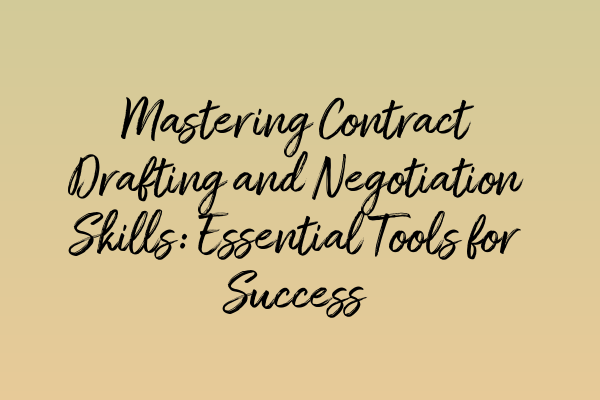Mastering Contract Drafting and Negotiation Skills: Essential Tools for Success
Contracts are at the heart of every business transaction, governing the rights and obligations of parties involved. Therefore, it is crucial for solicitors to possess excellent contract drafting and negotiation skills. These skills are essential for ensuring clear, enforceable agreements that protect the interests of clients and promote successful business relationships.
In this article, we will explore the key tools and techniques required to master contract drafting and negotiation. Whether you are a seasoned solicitor or a law student aspiring to become a solicitor, these skills are invaluable in your legal practice.
1. Understanding the Basics of Contract Law
To excel in contract drafting and negotiation, it is crucial to have a solid understanding of contract law principles. This includes knowing the key elements of a contract, such as offer, acceptance, consideration, and intention to create legal relations. Familiarize yourself with the various types of contracts, such as sale of goods, service agreements, and employment contracts.
2. Standing on Solid Legal Ground
When drafting a contract, it is essential to ensure that the agreement complies with all relevant laws and regulations. Be aware of any specific industry regulations that may apply to your client’s business. By staying up-to-date with the latest legal developments and industry standards, you can draft contracts that are legally enforceable and protect your client’s interests.
3. Clarity is Key
One of the most critical aspects of contract drafting is achieving clarity in the language used. A well-drafted contract should leave no room for ambiguity or misinterpretation. Use plain language and avoid unnecessary jargon or legalese. Ensure that the rights and obligations of each party are clearly stated and that the contract addresses all foreseeable scenarios.
4. Attention to Detail
The devil is in the detail, especially when it comes to contracts. Solicitors must meticulously review and analyze every clause, provision, and schedule to ensure accuracy and completeness. Anticipate potential issues and draft provisions that address them effectively. Ensure that all necessary definitions, warranties, indemnities, and termination clauses are included. Attention to detail is crucial in avoiding disputes and protecting your client’s interests.
5. Tailoring Contracts to Specific Needs
Every business transaction is unique, and contracts should reflect this. Tailor your contract templates to suit the specific needs of each client. Consider the nature of the transaction, industry-specific requirements, and the client’s objectives. By customizing each agreement, you can provide your clients with contracts that adequately address their concerns and protect their rights.
6. Effective Negotiation Techniques
Contract negotiation is an art in itself. A successful negotiation requires effective communication, active listening, and the ability to find common ground. Use persuasive language and logical arguments to present your client’s case. Be flexible and willing to compromise while ensuring that your client’s interests are protected. Negotiation skills are crucial for achieving favorable outcomes and building strong, lasting business relationships.
7. Continuous Learning and Professional Development
Contract drafting and negotiation skills are not mastered overnight. It requires continuous learning and professional development. Stay updated with legal developments, industry trends, and best practices in contract drafting. Attend workshops, seminars, and conferences to enhance your skills and network with other legal professionals. Continuous learning will ensure that you are always at the forefront of contract law and can provide the best possible service to your clients.
Conclusion
Mastering contract drafting and negotiation skills is essential for solicitors to excel in their legal practice. By understanding the basics of contract law, standing on solid legal ground, achieving clarity, paying attention to detail, tailoring contracts to specific needs, using effective negotiation techniques, and continuing to learn and develop professionally, solicitors can become confident and successful in their contract-related work.
If you are interested in exploring other areas of legal practice, be sure to check out the related articles below:
– Private Prosecutions: Exploring Non-Governmental Prosecutions in Criminal Cases
– Ethical Challenges in Criminal Defence: Navigating Dilemmas
– Understanding Drug-related Offences: Laws and Penalties in the UK
– Magistrates’ Court vs Crown Court: Different Paths in Criminal Proceedings
– Criminal Defence Strategies: Expert Approaches to Protecting Clients’ Interests
We hope this article has provided you with valuable insights into mastering contract drafting and negotiation skills. By honing these essential tools for success, you can navigate the complex world of contracts with confidence and ensure the best outcomes for your clients.


Leave a Reply